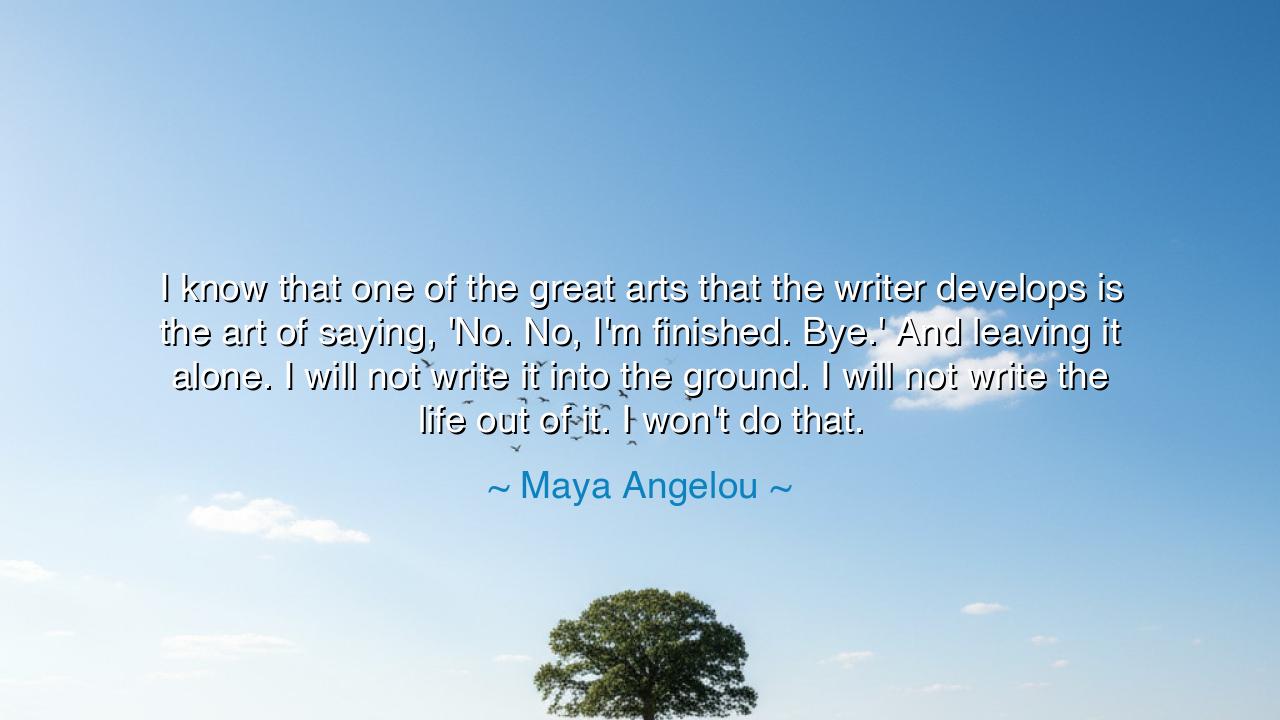
I know that one of the great arts that the writer develops is the
I know that one of the great arts that the writer develops is the art of saying, 'No. No, I'm finished. Bye.' And leaving it alone. I will not write it into the ground. I will not write the life out of it. I won't do that.






In the luminous and commanding words of Maya Angelou, poet of truth and guardian of the human spirit, we find a lesson not only for the writer, but for every soul that creates and loves deeply: “I know that one of the great arts that the writer develops is the art of saying, ‘No. No, I’m finished. Bye.’ And leaving it alone. I will not write it into the ground. I will not write the life out of it. I won’t do that.” These words, like all true wisdom, speak not merely of the craft of writing, but of the discipline of restraint, the sacred courage to stop, to let go, and to allow what is beautiful to remain alive.
The origin of this truth lies in Angelou’s long pilgrimage as a storyteller — one who shaped her life into art and her art into a legacy. She knew the temptation that haunts every creator: the urge to perfect endlessly, to smooth every edge until the soul of the work is worn away. For in creation there comes a moment when the heart says, “Enough,” even while the mind whispers, “More.” Angelou teaches that wisdom begins not in mastery, but in humility — the understanding that every work must breathe on its own, and that to overwork it is to “write the life out of it.” The artist’s task, then, is not to dominate creation, but to know when to let it go.
The ancients knew this sacred balance well. The sculptor Phidias, when carving the statues of the gods, was said to stop when his hand trembled — for he believed that to add one stroke beyond that point was to offend the spirit of beauty itself. Likewise, the poet Homer left his epics unfinished in places, trusting that the silences between his lines would carry more truth than endless elaboration. In their restraint, these masters honored the divine mystery that creation is never wholly ours — it is a partnership between human hands and something eternal. Angelou’s wisdom is the echo of this same law: that one must know when to step aside and allow the work, the love, the moment, to live without interference.
To leave something alone is an act of reverence. In life, as in art, there are times when we must step back from what we love — a poem, a dream, a relationship, a season of our own growth — and let it exist as it is, unpolished but pure. The river cannot flow if we clutch at its waters. The flower cannot bloom if we never stop pruning it. Angelou’s “No” is not rejection; it is honor — the final bow of the artist who recognizes that creation, like life itself, must be allowed to breathe freely.
Consider the story of Leonardo da Vinci and his masterpiece, The Mona Lisa. For years he carried it with him, endlessly refining its features, unable to declare it finished. He saw perfection always just beyond his reach. Yet when he finally died, the painting remained incomplete — not because of failure, but because perfection was never the goal. The true life of the art began when he ceased to touch it. So too, Angelou reminds us that life and vitality are fragile things; they cannot survive endless manipulation. To know when to stop is not weakness, but wisdom — for in stopping, we preserve the soul of what we have made.
This teaching extends beyond the world of writing and art; it reaches into the heart of existence itself. There are moments when we must say, “I have done enough,” and trust the work, the love, the journey, to unfold without us. The parent must let the child walk alone. The leader must let the vision pass into other hands. The dreamer must let the dream stand, imperfect but alive. To cling too long is to write the life out of it — to smother what was once living under the weight of control. Angelou’s words remind us that mastery is not found in endless effort, but in graceful surrender.
Therefore, my child, take this teaching into your heart: learn the art of enough. Know when to walk away — not in defeat, but in trust. When your work has spoken, let it stand. When your love has given all it can, let it rest. When your soul has reached the edge of its song, do not force another verse. Creation, like life, is sacred because it ends. The beauty of a flame is in its burning out, not in its resistance to die.
And so, let Maya Angelou’s wisdom be your guide: “I will not write the life out of it.” Let your work live, let your words breathe, let your heart know when to stop. For in the stillness that follows — in the silence after the final word, in the breath after the final brushstroke — there is peace, and there is eternity. The great art of living is not in holding on, but in knowing when to release, and in that act of letting go, becoming whole.






AAdministratorAdministrator
Welcome, honored guests. Please leave a comment, we will respond soon